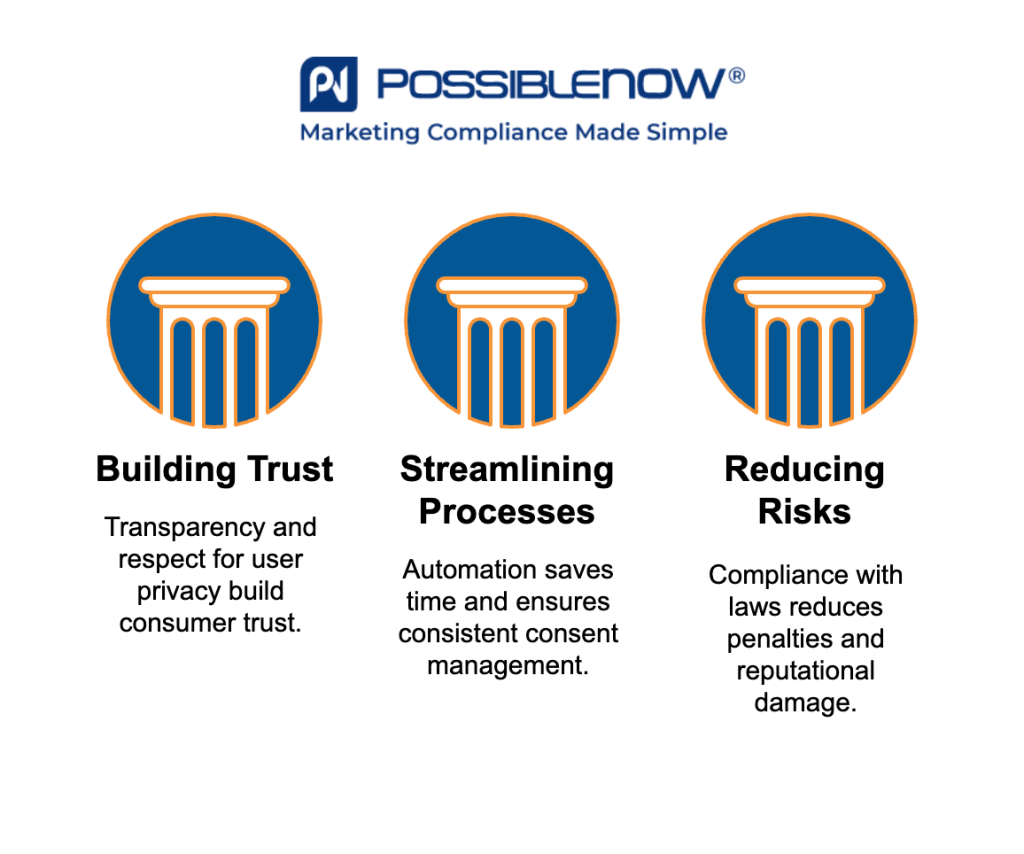Resource Center
Is It Mandatory to Have a Consent Management Platform?
Type: Blog
Topic: Consent Mgmt

Adhering to state and federal regulations is mandatory. Companies that choose to handle customer consent data without a designated platform run extremely high risks of financial penalties, brand damage, and loss of customer trust and business. So in a way, having a Consent Management Platform (CMP) is mandatory, especially those operating under strict data privacy regulations like the GDPR and CCPA.
Why CMPs Are Heavily Recommended
Data privacy regulations such as the General Data Protection Regulation (GDPR) in Europe and the California Consumer Privacy Act (CCPA) in the United States require businesses to obtain explicit consent from users before collecting, storing, or processing their personal data. These laws are designed to protect consumers’ privacy and give them control over their personal information.
A CMP facilitates compliance by automating the consent collection process, maintaining records, and providing users with the ability to manage their consent preferences.
Getting Started is Just a Call Away
Key Regulations Necessitating CMPs
The GDPR is one of the most stringent data protection laws globally. It mandates that businesses obtain clear and affirmative consent from users before processing their personal data. Failure to comply can result in hefty fines.
A CMP helps businesses manage consents effectively, ensuring compliance with GDPR requirements.
Similar to the GDPR, the CCPA requires businesses to inform consumers about the types of personal data being collected and to obtain their consent. It also gives consumers the right to opt-out of the sale of their personal data. A CMP provides the necessary tools to handle these requests efficiently.
Other states are following suit, choosing to tighten legislation at the state level. These are extremely difficult to monitor and track compliance with, and a proper CMP can drastically ease the burden.
What are the Benefits of Implementing a CMP?

Even beyond regulations, there are significant advantages to using a CMP. Here are a few of them:
- Building Trust: Transparency about data practices and respecting user consents and preferences can build trust with consumers. Users are more likely to engage with a business that prioritizes their privacy.
- Streamlining Processes: Automating the consent management process saves time and resources. A CMP ensures that consents are collected, stored, and managed in a consistent manner.
- Reducing Risks: By using a CMP, businesses reduce the risk of non-compliance with data privacy laws, which can result in severe penalties and damage to reputation.
Future of Data Privacy and CMPs
As data privacy laws continue to evolve, the need for CMPs will only grow. Emerging regulations in various regions and states are likely to adopt similar standards to the GDPR and CCPA, making it essential for businesses to stay ahead of the curve. Many states are choosing to go one step further, tightening those regulations.
Implementing a CMP is not just about compliance today but preparing for the future landscape of data privacy.
Choosing the Right CMP
Selecting the right CMP involves evaluating your business needs and the specific data privacy regulations that apply to you. Important factors to consider include the platform’s ease of use, integration capabilities, and support for different types of consents.
At PossibleNOW, we offer robust CMP solutions tailored to meet these requirements, ensuring that businesses can navigate the complexities of data privacy with ease. Learn more about our consent management platform solutions today!
About PossibleNOW
PossibleNOW is the pioneer and leader in customer consent, preference, and regulatory compliance solutions. We leverage our MyPreferences technology, processes, and services to enable relevant, trusted, and compliant customer interactions. Our platform empowers the collection, centralization, and distribution of customer communication consent and preferences across the
enterprise. DNCSolution addresses Do Not Contact regulations such as TCPA, CAN-SPAM and CASL, allowing companies to adhere to DNC requirements, backed by our 100% compliance guarantee.
PossibleNOW’s strategic consultants take a holistic approach, leveraging years of experience when creating strategic roadmaps, planning technology deployments, and designing customer interfaces. PossibleNOW is purpose-built to help large, complex organizations improve customer experiences and loyalty while mitigating compliance risk.
Download Our Consent & Preference Management Buyer’s Kit
-
TCPA Regulations and Compliance: Complete Guide
Type: Blog
Topic: Do Not Call Solution
-
Defining Meaningful Metrics: 6 Soft KPIs to Measure Customer Preference Collection
Type: Blog
Topic: Preference Mgmt
-
Email Preference Center Best Practices
Type: Blog
Topic: Preference Mgmt
-
The Basics of DNC Scrubbing: What Is a Do Not Call (DNC) Scrubber and Why Do You Need It?
Type: Blog
Topic: Do Not Call Solution
-
What is Consent Management, How it Works, & Why it’s Important for Data Compliance
Type: Blog
Topic: Consent Mgmt
-
Do Insurance Companies Cover TCPA Damages?
Type: Blog
Topic: Do Not Call Solution
-
8 Best Practices for Capturing GDPR Consent
Type: Webinars
-
Data Silos Cause Communication Gaps
Type: Videos
Topic: Preference Mgmt
-
Difference Between Preferences & Consent
Type: Videos
Topic: Preference Mgmt
-
Integrate Do Not Call Compliance with Preferences
Type: Videos
Topic: Preference Mgmt
-
Customer Preferences Require More Than One Flavor
Type: Videos
Topic: Preference Mgmt
-
Give Customers Opt-Down Options
Type: Videos
Topic: Preference Mgmt
-
Preference Center Organization
Type: Videos
Topic: Preference Mgmt
-
Strategic Consultants Benefited Scotiabank
Type: Videos
Topic: Industry Testimonials
-
My Call Center is Not in the US. Do I Need to Comply with US Telemarketing Regulations?
Type: Blog
Topic: Do Not Call Solution
-
How Many TCPA Violations Do I Have to Commit to Be Sued?
Type: Blog
Topic: Do Not Call Solution
-
How Does My Business Obtain a SAN Number to Access the DNC Registry?
Type: Blog
Topic: Do Not Call Solution
